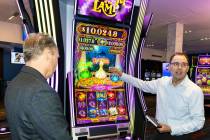Investors see real estate as key to Pinnacle, Boyd
Activist investors believe the real estate underneath casinos owned by Pinnacle Entertainment and Boyd Gaming Corp. is key to unlocking hidden value within the Las Vegas-based regional gaming operators.
Two New York-based hedge funds want Pinnacle and Boyd to spin off their casinos into real estate investment trusts, referred to as REITs.
Company officials aren’t sold on the idea.
Or, they’re not tipping their hands.
By law, REITs don’t pay federal income taxes. With real estate as the primary source of income, REITs are required to distribute at least 90 percent of their taxable earnings to shareholders.
Pinnacle rejected the REIT idea, which was proposed in April by Orange Capital. The investment firm has rights to acquire 7 percent of the company.
As for Boyd, the intentions of Elliot Management, which bought a 5 percent stake in the company in March, are unclear. Analysts, however, believe Elliot wants Boyd to divide into a REIT.
During their second- quarter earnings conference calls with analysts last month, Boyd and Pinnacle executives didn’t divulge any plans.
Boyd Gaming President Keith Smith said he “didn’t have anything to report” when asked on July 31 about shareholder activism.
Pinnacle President Carlos Ruisanchez wasn’t asked directly about Orange Capital by analysts on July 24. But he seemed to head off any questions about a REIT conversion.
“We are focused on our long-term prospects and how we create sustainable business improvements to drive shareholder value,” Ruisanchez said. “We continue to be thoughtful about the use of our resources and keep in front of us the things we believe we can control.”
Wells Fargo Securities gaming analyst Cameron McKnight said REIT conversions remain key topics for both companies.
Boyd operates 22 casinos in eight states, including nine in Las Vegas. Pinnacle owns 14 casinos in nine states, including two small Northern Nevada properties. The company doubled in size last year when it spent $2.8 billion to acquire rival Ameristar Casinos.
McKnight met with executives from the companies while he was in Las Vegas last week. He doubts either casino operator will pursue the REIT idea soon.
“Pinnacle and Boyd are evaluating all potential scenarios to unlock shareholder value,” McKnight told investors Monday. “That said, given the sizable net operating losses at both companies and the complicated nature of such deals, we do not expect to see any news in the near term.”
McKnight said both companies are more focused on paying down debt.
Pinnacle had $4.1 billion of debt at the end of the June. Boyd’s total debt was $4.33 billion, of which $1.12 billion was related to the company’s 2012 purchase of casino operator Peninsula Gaming.
Orange Capital and Elliot are not shy. Both have reputations as activist shareholders.
Orange had a small role in the unsuccessful 2013 proxy fight involving slot machine maker International Game Technology. Elliot has a history of buying into distressed or undervalued companies.
They could force the hands of the Pinnacle and Boyd.
The investment firms want the companies to follow the model built a year ago by Penn National Gaming.
The regional casino giant spun off ownership of 21 of its 29 casinos and racetracks — including M Resort in Henderson — into Gaming and Leisure Properties, a publicly traded REIT. The REIT leased 19 of the casinos back to Penn National and is running two of the casinos through subsidiaries.
Penn shareholders were also given shares of the REIT as part of the split.
In February, Gaming and Leisure issued its first dividend — $11.85 per share — or $1.06 billion.
Since the spinoff, the REIT has not sat quiet. Gaming and Leisure bought an Illinois riverboat casino for $140 million in December. Five months later, the company acquired a racetrack and casino near Pittsburgh owned by Las Vegas-based Cannery Casino Resorts for $465 million. The deal is expected to close in December.
It’s widely speculated Gaming and Leisure wants to acquire regional casino operator Isle of Capri and the company’s 15 casinos.
In a statement, Orange Capital said a Pinnacle REIT transaction would result in a 60 percent to 90 percent increase in the company’s stock price. Pinnacle shares closed at $23.88 on the New York Stock Exchange Tuesday, up 5 cents or 0.21 percent.
Michigan stock investor Chris Katje, who writes for The Street and Seeking Alpha, said Penn shareholders saw gains of 56 percent since the company’s REIT split. He said Pinnacle shareholders would experience similar benefits.
“Regional casinos are a tough market,” Katje wrote for Seeking Alpha this month. “As Pinnacle feels the pinch on top line sales, it needs to be aggressive here to maximize shareholder returns.”
He said there is a 75 percent chance Pinnacle spins off into a REIT.
“The tax benefits and return to shareholders are worth the move,” Katje said in an email. “This will be a continued trend for casino-related stocks and also could move into the horse racing and even the racetrack (NASCAR) segment.”
Howard Stutz’s Inside Gaming column appears Wednesdays and Sundays. He can be reached at hstutz@reviewjournal.com or 702-477-3871. Follow on Twitter: @howardstutz.




























